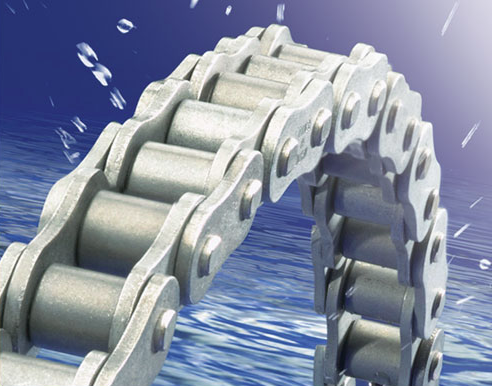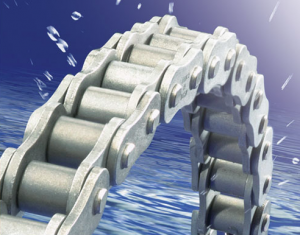
Chains drive your process
Every process has unique requirements that could make choosing the right chain a mission-critical exercise.
September 2, 2016 | By Ray Hensley


Photo: Reynold Jeffrey
When manufacturers need to create a versatile high-speed process, they often use high quality attachment chain to move products along the line. Choosing the right chain and getting it fast can be critical; if the line stops due to a chain failure, so do profits and delivery schedules.
Attachment chain is used in many processes and diverse industries, including food and beverage, pharmaceutical, packaging, printing, lumber and plywood production. Each of these operations uses custom attachment chain that is engineered to meet the rigours of the specific industry and process. Custom attachments and pins can be configured to form the backbone of the process required.
Custom chain manufacturer, Renold Canada, provides many custom attachment options and capabilities, including bends, chamfered edges, grooves, mounted special rollers, pushers, support rollers, rocker arm attachments, serrations, stickers, supporting brackets, tabs featuring slopes and curves, wings and many other custom features. The chain manufacturer provides several custom pin options and capabilities, such as holes, shoulders and cut-ins, extensions and threading.
Many of these popular made-to-order custom attachment chains have no additional tooling costs as well:
- Single-Pitch Chain: Nos. 40, 50, 60, 80, and 100
- Double Pitch Chain: Nos. C-2040, C-2042, C-2050, C-2052, C-2060-H, C-2062-H, C-2080H, and C-2082-H
The chain manufacturer often receives queries on what the lead-time is for custom attachment chain. Relative to other chain suppliers, the lead time for custom orders is reduced. Typical delivery time for “in-stock” chain from Europe is about 12 weeks. Some chain manufacturers have standard lead times for custom attachment chain that are eight to 12 weeks. That’s a long wait for a process you have to get up and rolling as soon as possible.
But since Renold manufactures attachment chain in North America, the chain is made, shipped and transported much faster, a customer can expect a four-week lead time on custom attachment chain orders. The company has the goal of delivering custom chain within two to three weeks by October 2016.
Operating Conditions
Another point to consider is the environment in which the chain will operate. Many processes with high moisture content during production can corrode a carbon steel chain in a few days. This will dramatically shorten the life of the chain and ultimately lead to a chain failure if not taken into account.
Renold Hydro-Service chains protect an operation in these corrosive environments. These strong, longlasting chains are mechanically treated and stand up to wet, humid and even saltwater operations. They last up to 30 times longer than conventionally coated chains without the risk of hydrogen embrittlement, and are as strong as conventional carbon steel chains. The Hydro-Service chains are also more economical as compared to stainless steel systems.
All components of Hydro-Service chains are mechanically treated prior to assembly. This provides complete coverage and protection to all vital surfaces, including the critical pin/bushing interface. Mechanical plating maintains the integrity of the chain without risking the embrittlement that conventional plating can cause. Unlike conventional zinc or nickel plating, Hydro-Service coating will not chip or peel under even the toughest conditions. Plus, Hydro-Service chain contains no hexavalent chromium, a known carcinogen.
Renold Hydro-Service vs. Nickel Plated and Carbon Steel

After 60 days in an unprotected outdoor environment, Renold Hydro-Service shows no signs of corrosion as compared to carbon steel and nickel plating.

After 14 days in and out of 5% saltwater solution (seawater), Hydro-Service clearly outlasts nickel plated and carbon steel chain.
For many applications a self-lubricating chain makes more sense. In these cases a traditionally lubricated chain can harbour foreign materials within the lube or sling the lubricant during operation. This can contaminate or stain the end product, increasing waste in the process.
Renold Syno chain sets a new benchmark for sanitary chain applications. Syno Chain is a maintenance-free, nickel-plated chain that provides uncompromised performance with no additional lubrication required. Available in both small and large pitch sizes, it can run anywhere a standard chain can, which makes it suitable for a wide range of applications.
Syno Small Pitch is the chain you would choose for sanitary applications or when contamination from lube must not occur. Both the captive lubricant (USDA H-1 approved) within the sintered bushing and the coating on the roller are food-industry approved so no additional lube is needed. And the nickel plating on the side plates won’t chip or peel, making it ideal for food production.
Syno Large Pitch is engineered for heavier loads with a highly durable and wear-resistant polymer developed specifically for Renold. A polymer sleeve between the pin and bushing, combined with a polymer roller, allow it to operate completely lube free. And due to its proven impact resistance, load capabilities, and corrosion-resistant surface, Syno Large Pitch can stand up to almost any high-load environment like automotive assembly, steel mills, forestry, sawmills, paper mills, mixers and textile plants.
Syno chain also provides excellent wear and fatigue resistance, far outlasting other low-lube or no-lube chains. If your process must operate lube free but can’t compromise on performance, Syno chain can boost your productivity and reduce downtime.
Many industries utilize self-lubricating Syno chain due to the nature of the products being produced. Here are a few of the most common applications:
Automobile Assembly: Vehicle panels and interiors are prime examples of assembly line products that must not be contaminated by lubrication.
Bottling: Chain used in bottling applications must cope with spillage. Corrosion resistance and lube considerations are key.
Food: Cleanliness is critical in all food processing environments.
Packaging: Since first impressions are paramount to product image, packaging must come off the line free of contamination.
Paper: Paper mills go to great lengths to ensure their output is protected from grease and dirt.
Sawmills: Lubrication attracts the grime and debris inherent in a sawmill, causing a dramatically shortened working life under such heavy loads.
Textiles: Chain lube can create stains on textile lines.
Whether your process dictates an attachment chain with a myriad of options, a corrosive environment chain, or a super clean self-lubricating chain, there are many options available to meet unique specifications.
This article was published in the June issue of Machinery and Equipment MRO.
Ray Hensley is the sales and engineering manager for Renold Jeffrey. For more information, visit www.renoldjeffrey.com.
